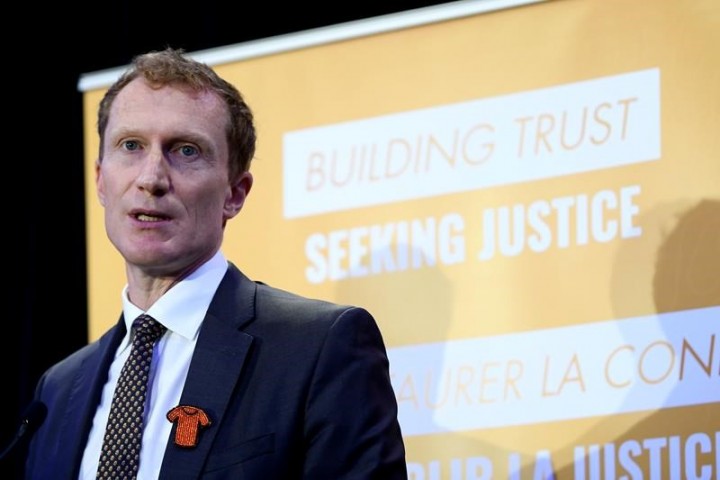OTTAWA — Canada’s decision to abandon its appeal of a 2015 court ruling that freed Catholic groups from the need to raise $25 million for residential school survivors has caused anger and confusion.
Last fall, a package of more than 200 pages of briefing notes and court records was prepared for Crown-Indigenous Relations Minister Marc Miller, who promised he would look into what transpired. The Canadian Press obtained the records under federal access-to-information laws.
Many of the documents, including a timeline of events, are redacted, either partially or fully. According to details available, here is a timeline of what happened:
May 2006: The historic Indian Residential Schools Settlement Agreement is approved by parties. The agreement involved the Canadian government, lawyers representing residential school survivors, churches that operated them and national Indigenous organizations.
September 2007: Implementation of the agreement begins. It includes direct payments to survivors and fulfilment of financial obligations to which parties, including Catholic entities, agreed. Catholic groups signed on to three financial commitments totalling $79 million. Included was a $25 million “best efforts” fundraising campaign to raise money for survivors.
October 2011: Federal officials say the Catholic entities tried to reduce part of their contributions to an Aboriginal Healing Foundation by claiming $2 million in administrative costs and legal fees.
December 2013: The federal government, led by former Conservative prime minister Stephen Harper, seeks direction from court.
September and October 2014: “Negotiations result in agreement to settle for $1.2 million,” the government-prepared chronology reads. It says a disagreement occurred over the scope of the release. “Canadian Catholic entities party to the Indian Residential Schools Settlement assert a full and final release of all financial obligations, including fundraising activities.” The entities say this agreement was reached orally and by email.
November 2014: Catholic entities go to court asking for a full release from all their financial obligations, arguing it was already agreed upon.
July 16, 2015: After a June hearing a Saskatchewan judge rules in favour of the Catholic entities, finding an agreement for a full release was indeed in place. However, according to officials, there was a lack of clarity around whether the court released the Catholic entities of all obligations, financial and non-financial.
August 2015: Canada files what’s known as a “protective notice of appeal” while it continues to negotiate with Catholic entities. The same month, Harper announces the start of a federal election.
“The appeal allowed time for Canada to attempt to negotiate the scope of the release in the hopes of protecting the $1.2 million settlement,” reads a government briefing note from November 2021.
September 2015: Government signs off on a recommendation for the Department of Justice to seek a court order and release agreement in exchange for $1.2 million. The 2015 document is signed by a minister, whose signature is illegible. Miller said it belonged to Bernard Valcourt, Harper’s former minister of Aboriginal Affairs.
Officials say while the court ruling allows Catholic entities to walk away from the $25 million fundraising campaign — after only raising less than $4 million — “the likelihood of compelling the Catholic entities to meet their remaining fundraising obligations is very low.”
Oct. 19, 2015: Harper is defeated by Justin Trudeau, whose Liberal party wins a majority government in the federal election.
Oct. 30, 2015: The former deputy minister of Aboriginal and Northern Affairs Canada signs a final release agreement, freeing the Catholic entities of their financial obligations.
Nov. 4, 2015: Members of Trudeau’s new cabinet are sworn in. Miller, who wasn’t named to cabinet at the time, said there is no evidence people in cabinet knew of the agreement.
Nov. 10, 2015: Ottawa withdraws its appeal notice.
This report by The Canadian Press was first published Aug. 20, 2022.
Stephanie Taylor, The Canadian Press
Related


































